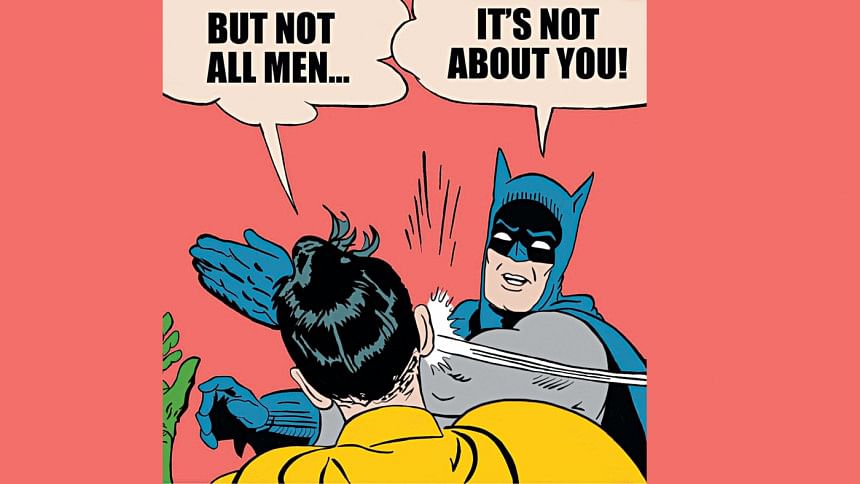Why we need to steer clear of "Not All Men"

"Not All Men" is basically an expression that is used to refer to the posts, comments and statements by people to claim that not every man out there has sexually harassed or abused someone, or harbours any such intention. When such incidents are reported, or when a woman comes forward with allegations of sexual assault, there is, more often than not, someone saying something along the lines of "Not All Men". This intentionally or unintentionally drowns the woman's voice by taking the focus away from her and placing it on the protection of the image of men. These comments gain hordes of supporters because as they try to put it, not all men harbour such desires.
In the patriarchal world we live in, it is not easy for women to come forward with allegations of sexual harassment or assault. Very few incidents make it to the news and when they do, united efforts are needed to address them. In a situation that is already fraught with so many challenges, "Not All Men" alters the course of discussions, accomplishing nothing except making things worse and hindering progress.
Anupa Ahmed*, who works for an international organisation and is vocal about women's rights, expresses utter disapproval of it when I approach her, "When someone makes a 'Not All Men' comment, protecting male image becomes even more important than discussing violence against women, preventing conversations that are actually necessary." She tells me how incidents of sexual harassment and the normalisation of rape culture left her traumatised and how she used to blame and doubt herself at a young age. Things like Not All Men, she says, make it even harder for women to find the courage to protest.
Discussions regarding men are necessary when it comes to preventing violence against women, but instead of screaming "Not All Men", it is important that we understand, among other things, that the way boys are brought up in a patriarchal society is one of the many reasons sexual violence takes place.
To get an insight into this, I approach Laila Khondkar, a child protection specialist. "Most parents follow gender stereotypes while raising children. Children (both boys and girls) get used to stereotyped images of men and women through books, films, advertisements etc," she says. "Social conversations and jokes also fuel this. Because of such stereotypes—and in many cases, witnessing a kind of power imbalance between their parents—boys grow up having a sense of sexual entitlement over women. This is one of the reasons many boys do not learn to respect women and understand consent." After talking to her, I realise how important it is to address parental flaws, something that often gets overlooked in our society.
When a woman comes forward with allegations of sexual violence, the only discussions should be on the need to educate men on consent and gender equality. There should be conversations about the need to end the normalisation of rape culture and jokes (which are neither funny nor harmless).
While no man can possibly live through what a woman goes through from the day she is born, they can at least try to empathise and make the path to justice easier instead of screaming "Not All Men" and drowning the voices that have always been shackled and muffled by patriarchy.
*Name has been changed to protect anonymity

 For all latest news, follow The Daily Star's Google News channel.
For all latest news, follow The Daily Star's Google News channel. 



Comments